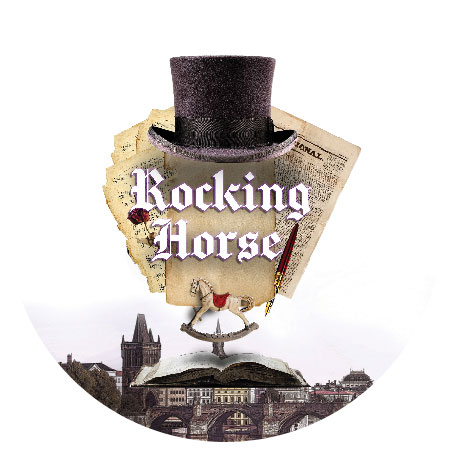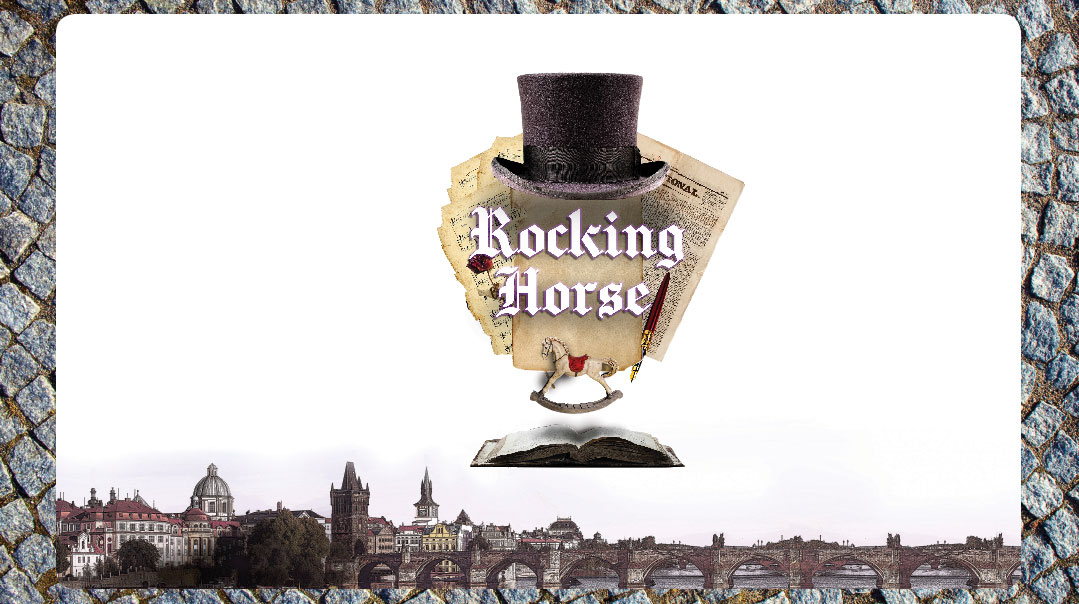Rocking Horse: Chapter 45

“Chasya…makes me think. She surprises me. More than anyone else I have met. Even my professors”

It is a comfortable carriage, with lovely, soft leather upholstery. Hannah runs her fingers over it, then pulls the blanket up over her arms. Emmy is snoring gently, and Felix has his head in a book. And she just sits, disbelieving.
Shneur offered to join them, but she does not want to take him on a wild goose chase. Ernst offered, too, but the guest conductor is an ogre and Ernst could not take time off without risking a public dressing down.
So she travels the road to disappointment. It will not be a surprise to find nothing at their destination. It’s what she expects. But the possibilities graze her throat, making it hard to swallow.
Felix peers at Emmy’s closed eyelids and then addresses her. “Did you know, Mama?”
“What?”
“About Chasya?”
“Know what?”
“That she has plans to move to Eretz Yisrael.”
Hannah lets out a long breath. No. She cannot support him through this. There is only so much emotion that one can contend with. Felix does not realize that the faces from the photographs haunt her dreams. He does not know how grief makes her lonely.
Oh, she could share it with Ernst, and he would try to understand, how every loss carries a deep separation. You seem to be living the same life as always, one that parallels the lives of your neighbors and friends and the people who say hello to you. You seem to walk the same streets, pray in the same shul, live in the same city, but you don’t, not at all. And this is true even of your family.
Perhaps this is why there’s a custom not to greet mourners. Do not dare suppose that you can build that bridge into their world.
She sighs. Felix waits for her reply. “No. No, I did not know. But now that you say it, I am not surprised.”
“Why? What’s there for her, apart from dust and fellaheen and malaria?”
“What’s there for her in Paris or London or New York? She would be adrift there, alone. In Eretz Yisrael, she will find companionship.”
“Who? All the strange people who do not fit in? Who are living under the Ottomans?” His voice is raised and she puts her fingers to her lips. This is not a conversation for Emmy to hear.
“Well, Becca is living under them, too.”
He shakes his head and a shadow flickers across the wall of the carriage.
“It is dangerous. It is a barren, empty place.”
“No more dangerous than where she grew up. And nothingness would not deter Chasya.”
“
But—”
“She grew up on a farm, Felix. It is natural for her to work the land, or join people who do. And difficulties do not deter her.” Hannah removes the cushion from behind her back, plumps it up, and returns it. “She is not like you or me. A night without a firm mattress and a feather pillow and I think about how all the world suffers and you think about the existential nature of the human condition. And all we needed was a feather pillow.”
“I am not—”
“Are you not?” She gives a little chuckle. “We are spoiled, Felix. And that’s fine while we can enjoy it. But when it is taken away from us, we are like little children. It is too hot, Mama, or too cold, and the food is not to my taste, and the spade makes my arms ache, and what does that mean, Mama, does that mean that you do not love me, after all?”
Felix watches her carefully. “Is that really what we are like?”
Hannah shrugs.
He presses her. “You do not think that Emmy and I could do such a thing?”
“Go to Eretz Yisrael?” She shakes her head. “No. No, I do not.” She does not add: to my regret.
An uncomfortable silence settles between them.
“I could do it, Mama.”
He sounds like a little boy and her heart goes out to him.
“Could you? Could you really? Could you live in a hut with the wind coming through the wooden slats, and the first night you think you are a hero, the second that you are on an adventure, the third that maybe someone duped you, who is taking the lumber, who was paid to erect the huts and did such a shabby job. By the fourth you are planning your return to your snug little house in the city of Prague, where everything is comfortable and you can spend your days debating the meaning of suffering and the suffering in meaning, without having to do anything.”
She reaches out and wraps her fingers around his. “I say this not because I do not respect you, but because I love you. Your father and I brought you up this way.” She looks out of the window, sees the gray shadows flicker in a monstrous dance. “Was it a mistake? Who knows? We followed the path that had been set for us, that felt right, that would give you some opportunities, even if it closed others.”
“Mmm.”
Maybe it was for this conversation that they are traveling from home, that she’s leaving Ernst, and her own feather pillow, and more, being jogged straight toward her sense of loss. For Felix. She speaks quietly, for Emmy keeps jerking awake before closing her eyes again.
“I know, more than anyone, that if one is intent only on surviving, then the soul can either fly or it can flounder, and I did not want you and Emmy to flounder. I wanted you both to be coaxed gently into life and love.
“But now… I do not know if you could do this, Felix.”
Her words are hurting him, she knows that without even seeing him, and she takes a deep breath. But to do otherwise, would not be fair. Not to him, not to Chasya. If he cannot do it, if he will not be able to bend towards her, then better he should forget her, though G-d knows this conversation is wringing her heart. Chasya. Chasya as Felix’s wife. For a second, the image is rosy before her, but then it vanishes.
“Do what?”
“Marry Chasya and move with her to Eretz Yisrael. I do not know what you are made of.”
All this time she has been waiting for him to bring his feelings out into the open. Men, Sarah always says, are surprisingly reticent. But everything is better for an airing.
“Felix?”
His words are halting. “Chasya…makes me think. She surprises me. More than anyone else I have met. Even my professors.”
Hannah laughs and the tension is suddenly broken. “Ah, Felix. Only you would talk to me about the way she makes you think instead of the way she touches your heart.”
The director of the Alliance Boys’ School is marking essays in French. Becca looks at the pages filled with careful, though childish handwriting, and shakes her head in wonder.
“One day, you shall have your own school, and you, too, will rue the wordiness of little boys who will hardly open their mouths in conversation, but will write reams of words on a page.”
“It is hard for me to believe that.” She threads her fingers together. “I’ve been helping a girl—”
“I have heard.”
“I received advice to take her back to her family.”
He sniffs and puts down his pen. “Three weeks’ journey. One week to rest. Three weeks’ return. You shall be gone almost two months. You have already taken up, what, three months out of the six that the director gave you.”
“So what do you advise?”
“Well, either you ignore the problem, which will raise the ire of the community and not help your school. Or you send her alone, which would not be advisable seeing the… delicacy of her condition. Or you go to Europe and stay there with her, and ask the director to find a replacement for the school. Or you go and return. Four options. Only two of which are viable.”
She suppresses a smile. The man is as intolerable as Felix.
“If you work with the Rosh Kahal, you will score some merit in the eyes of the director. He is vocal about building bridges.”
“And then?”
“Stay or return? That is up to you.”
Very helpful. She nods her thanks and stands up to leave. As she walks through the streets of Izmir, she thinks it through. She cannot send the girl by herself. Possibly, the girl could stay, and become her assistant.
She pushes aside a vine that hangs down over the alleyway.
Not a likely plan. The girl barely speaks, hardly moves. She is in some kind of shadow-land.
As the director said, there are few choices. Raizel needs to return to her family, and be nursed back to health.
And what of her own future? She is by the marketplace now. She blinks and takes in the colorful rugs, the smells of cinnamon and spices, the colors of ochre and orange. Where does she belong? Presumably, she will stay with Hannah and Ernst for a week or two. And then what? The idea of this journey makes her feel weary, and takes away her joy in life. In people’s goodness.
As she passes through the marketplace, she sees the door open to the home of the forger who supplied her passport. Without thinking, she knocks and steps inside. She remembers the way through the kitchen area to the room where he works and she opens the door to the man’s office and stands in the doorway.
He look up at the noise. It takes a moment but she waits until his eyes flicker with recognition.
“You told me that you make a lot of passports.”
“Yes.”
“And what else?”
He shrugs and combs his fingers through his dark beard. “Immigration certificates.”
She thinks of Raizel and straightens her back. “Give me names.”
He laughs. “Names? Names are just names of names of names of names. They are far, far away from flesh and blood. They change with the rising of each dawn.”
Anger pummels her. She leans forward and slams her fist on his table. His pen jumps and ink splatters on the paper.
He stands up and faces her. “What does it matter, names? Evil is evil. Leave it be. Do not touch it.”
How can his face be so calm? How? She thinks of Raizel, the Raizel that was, ready for adventure. She raises her voice into a shout. “If… if you do not touch it, it runs through the streets, dancing.”
He raises his hands. “Evil was created along with the world.”
“But you! You do not have to be part of it. You do not have to provide it with certificates, take its coins.”
His mouth tightens. “It is all right for you. A moral European. You have everything you need. Saying no to evil will not buy my son a workbook to learn from. It will not pay a doctor to see my baby.”
She recites along with him in her mind — no shoes for the winter rain, no food to stop rickets eating at a child’s bones, no money for a dowry.
He continues but she is no longer listening, and she can bear it no longer.
She holds up her hand. “Stop,” she says. “Stop now. Do you think I would be living here in Turkey if I had not learned these lessons on my own skin? In my blood?”
To be continued…
(Originally featured in Family First, Issue 714)
Oops! We could not locate your form.

